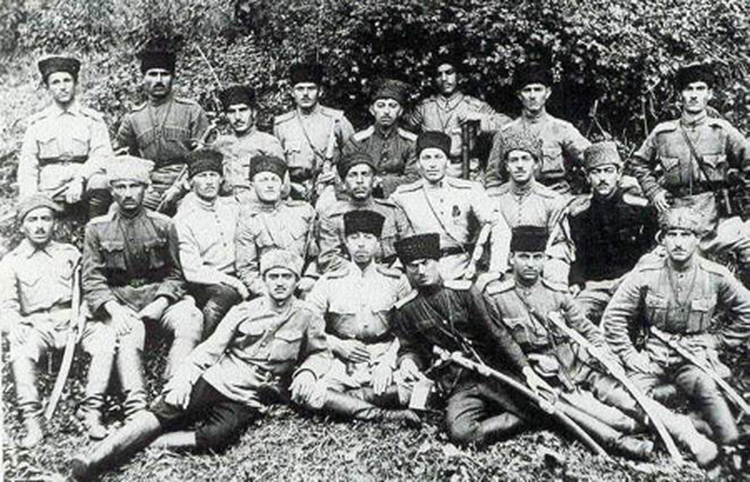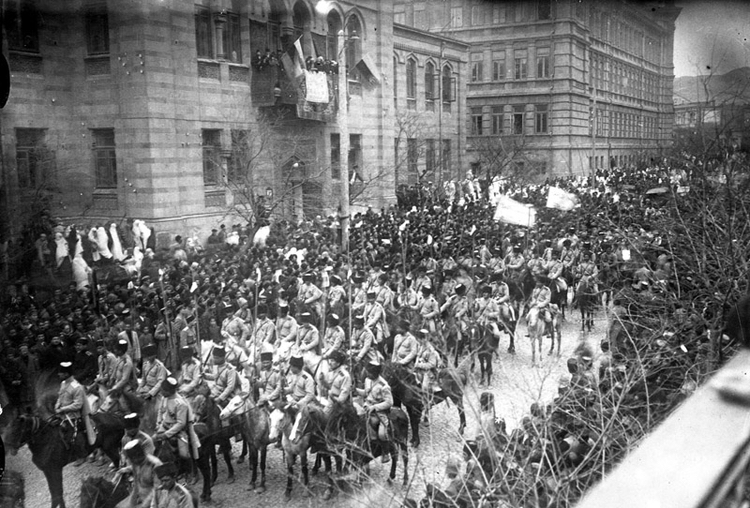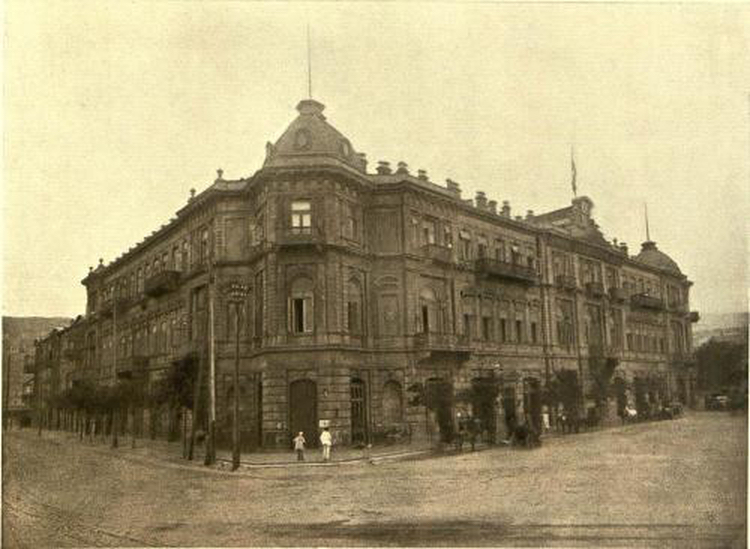The period of the Democratic Republic of Azerbaijan
The establishment of the Democratic Republic of Azerbaijan on May 28, 1918 was a historic event and one of the glorious pages in the history of Azerbaijani people.
The Democratic Republic’s Government moved to Ganja on June 16, 1918.

When the Azerbaijan Democratic Republic was declared the Azerbaijani Government was temporarily based in Ganja, as Baku was under Bolshevik-Dashnak control headed by Stepan Shaumyan. The main task of the Government of the Azerbaijan Democratic Republic was to liberate Baku from the occupation. It was not possible to carry out military operations against the 18000 troops of the Baku Soviet by only 600 troops of the National Government.
On the eve of the formation of the republic, representatives of Azerbaijan came to Istanbul and asked for help from the Ottoman Turkey. Taking into account the situation, Defense Minister of Turkey Enver Pasha ordered his brother Nuru Pasha to move from Tabriz to Ganja with the military units he headed.
On June 4, 1918, the Azerbaijani Government signed a “Treaty of Mutual Assistance and Friendship” with the Ottoman Empire. According to the document the Ottoman Empire committed to provide military assistance to Azerbaijan.
However, in order to put an end to the activity of the National Government of Azerbaijan the Bolshevik-Dashnak army of the Baku Soviet launched an attack in the direction of Ganja on June 10, 1918.

In the areas where military operations were carried out, Muslim population were subjected to looting and genocide. In June 23, the Azerbaijani Government declared a state of martial law in the country. On June 27 – July 1, the Caucasian Islamic Army led by Nuru Pasha decided the fate of the war in battles near Goychay. The attack of the Baku Commune and Soviet military units to Ganja was prevented and the Caucasian Islamic Army moved towards Baku. The Dashnak-Bolshevik troops were forced to retreat. One after another Goychay, Kurdamir, Agsu and Shamakhi were liberated from Dashnak-Bolshevik occupation. It was Baku’s turn.
At that time, Colonel Lazar Bicherakhov, the commander of the Cossack division fighting against Bolsheviks and carrying out military operations in the territory of the Tsarist Russia in Iran, was in Baku. The armed forces led by Bicherakhov took a defensive position in Bilajari station in the North of Baku.
The anti-Azerbaijani policy pursued by the Baku Soviet of People’s Commissars led to complete discrediting of Bolsheviks and their resignation on July 31, 1918. Taking advantage of this situation, eser-mensheviks and the dashnaks established a so-called Central Caspian Dictatorship on August 1 in Baku. From the early days, this authority took a position of taking reprisals against Bolsheviks and inviting the British troops located in South Azerbaijan to Baku. On August 4, the first English troops consisting of 300 officers and soldiers arrived in Baku.
The first attempt to liberate Baku from the occupation was made on August 5, 1918. On that day, the Caucasian Islamic Army together with Detached Azerbaijani troops launched its main attack against positions at the Wolf’s Gate. However, the first attack failed.

On August 17, the Armenian National Council warmly welcomed the troops led by the British General Lionel Dunsterville to Baku. Dunstervill’s troops in Baku consisted about 1000 soldiers and officers. The Army Headquarters was located at the hotel “Europe” (present Lukoil building) and the other parts of the army were disposed at “Metropol” hotel (present National Museum of Azerbaijani Literature named after Nizami Ganjavi). Dunsterville was instructed to have the oil of Baku and not to let the Caucasian Islamic Army into the city.
Bicherakhov secretly agreed with General Dunstervill on carrying out joint operations against the Turkish Army. On July 30, Bicherakhov realizing the inevitable defeat before the Caucasian Islamic Army, withdrew from the front line and led his troops to the north in direction of Port-Petrovsk (present Makhachkala).
On the night of September 14, the Caucasian Islamic Army performed its duties successfully by the next attack on Baku. By the night of September 14, the forces of Dunstervill evacuated the city for Anzali. On September 15, the battles did not last long. The same day the Central Caspian Dictatorship was defeated. The two-day military operations carried out by the Turkish-Azerbaijani forces for the liberation of Baku was completed with a clear victory.
On September 16, on the occasion of the glorious victory, the military parade of Turkish-Azerbaijani forces was held.
After the stunning and historical victory, the capital of the Azerbaijan Democratic Republic was moved from Ganja to Baku on September 17. Thus, the main stage of state building in Azerbaijan was launched.
On September 18, the decision on restoration of public self-government of Baku city was made. The Turkish military troops abondened Baku as a result of the Ottoman Empire’s defeat in the World War I (1914-1918). The British troops entered Baku and the Baku-British Governorship –General was established. On december 7, the parliament of the Democratic Republic of Azerbaijan was launched.

The local government was headed by a governor in Baku. According to the government resolution of February 5, 1919 Rashid bey Akhundzade, then the government resolution of August 25,1919 Amir bey Narimanbeyov were appointed to a position of the governor of Baku.
The recognition of the ADR’s independence by the international community on January 11, 1920 was solemnly celebreted in Baku.
But Soviet Russia hasn’t forsaken its plan to capture Baku. The Baku operation was made and on the night of April 25 to 26, 1920, the 11th Red Army of the Soviet Russia crossing the border of the Democratic Republic of Azerbaijan moved to Baku. On April 27, an ultimatum on the transfer of power to the Bolsheviks was sent to the Parliament of the Democratic Republic of Azerbaijan. The Parliament, under the military intervention, realized a forced adopatation of decision on the transfer of power to the Bolshekivs at 11 pm. After, Baku was invaded by the 11th Red Army.
Thus, the Democratic Republic of Azerbaijan, which exists only 23 months, was collapsed.
